NC State Extension Helps Ensure Positive Returns for Cattlemen
go.ncsu.edu/readext?983778
en Español / em Português
El inglés es el idioma de control de esta página. En la medida en que haya algún conflicto entre la traducción al inglés y la traducción, el inglés prevalece.
Al hacer clic en el enlace de traducción se activa un servicio de traducción gratuito para convertir la página al español. Al igual que con cualquier traducción por Internet, la conversión no es sensible al contexto y puede que no traduzca el texto en su significado original. NC State Extension no garantiza la exactitud del texto traducido. Por favor, tenga en cuenta que algunas aplicaciones y/o servicios pueden no funcionar como se espera cuando se traducen.
Português
Inglês é o idioma de controle desta página. Na medida que haja algum conflito entre o texto original em Inglês e a tradução, o Inglês prevalece.
Ao clicar no link de tradução, um serviço gratuito de tradução será ativado para converter a página para o Português. Como em qualquer tradução pela internet, a conversão não é sensivel ao contexto e pode não ocorrer a tradução para o significado orginal. O serviço de Extensão da Carolina do Norte (NC State Extension) não garante a exatidão do texto traduzido. Por favor, observe que algumas funções ou serviços podem não funcionar como esperado após a tradução.
English
English is the controlling language of this page. To the extent there is any conflict between the English text and the translation, English controls.
Clicking on the translation link activates a free translation service to convert the page to Spanish. As with any Internet translation, the conversion is not context-sensitive and may not translate the text to its original meaning. NC State Extension does not guarantee the accuracy of the translated text. Please note that some applications and/or services may not function as expected when translated.
Collapse ▲Calving season is money season for North Carolina’s beef producers. The new offspring are immediate assets, either to be sold when weaned or used to replenish herds.
A successful calving season depends on a successful breeding season. But that won’t happen if the bulls are firing blanks.
“They got to get it done in a defined breeding season,” said Jimmy Harris, a cattleman who raises Angus in Warren County. “Open cows [ones that aren’t pregnant] don’t have any positive return.”
To help ensure cattlemen in her area have a productive calving season, Kim Woods, NC State Extension agriculture/animal science agent for Granville and Person counties, organizes an annual bull breeding soundness exam (BSE) clinic.
“Our Extension veterinarian, Tom Van Dyke, comes in and performs an exam,” she said. “There’s no way to test libido, but it’s just basically making sure they’re physically able to do the job. Because if they can’t do the job, then that’s potentially a whole calf crop loss for that farmer or reduced calf crop. If they don’t have as many calves to sell, they have lost income.”
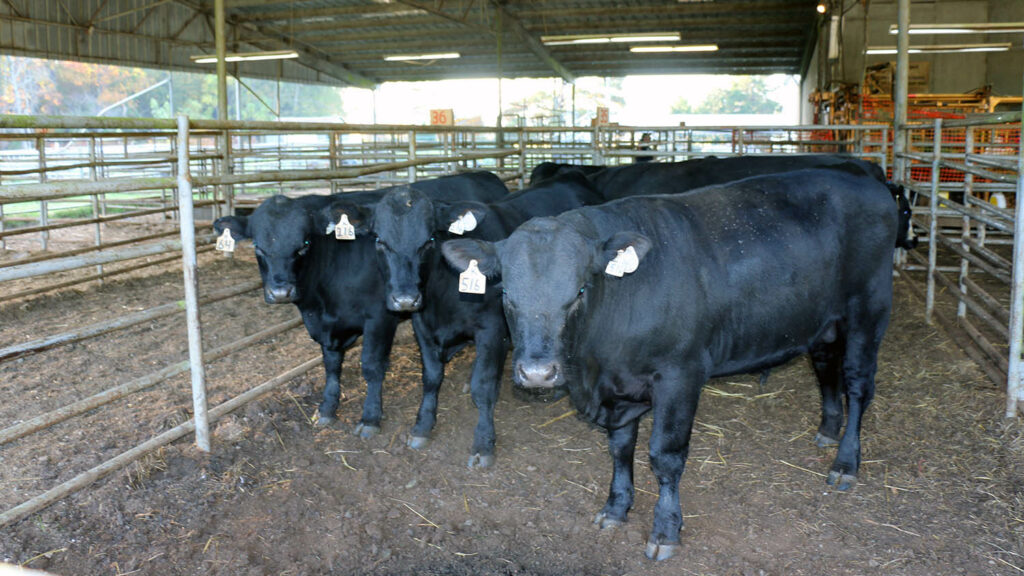
Bulls wait in a holding pen before being evaluated for their ability to breed cows. The annual exam in Granville County helps area cattlemen remain profitable.
Breeding season in North Carolina typically begins in late November and lasts through January.
“Most people calve in the fall, September and October, so December and January is when a lot of bulls get put in,” Woods said. “This gives them the opportunity to check on that bull so if it’s not sound they can buy another one or borrow one. We do it once a year because we’re trying to target the timing so they can make decisions if they have an issue.”
The 2023 BSE clinic took place in October at the Granville County Livestock Arena outside Oxford. It took a team of NC State Extension experts to work with the large animals. Matthew Place, then the animal agriculture agent in Warren County and now the agriculture agent in Franklin County; Bailee Perkins, livestock agent in Caswell County; Tyrone Fisher, North Central District Extension Director; and Woods worked the holding chute and guided the bulls from chute to holding pens. NC State Extension Director Rich Bonanno was on hand to help out and observe the program.
“Every year we at least have one or two that’s going to fail the test or be deferred so they can be tested later,” Place said. “If the farmers hadn’t known that after coming through here, their calf crop would be in peril. We have had somebody say that was the only bull he had, so they wouldn’t have any cows bred if we hadn’t done the test.”
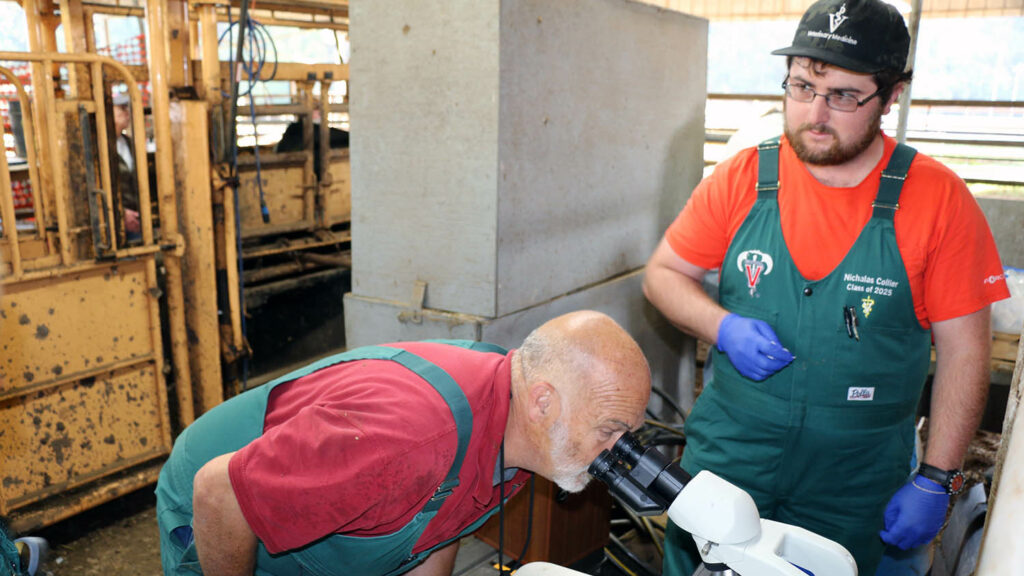
Extension beef veterinarian Tom Van Dyke and his team, including third-year NC State veterinary student Nick Collier, perform on-site reviews. Bull owners typically receive results within 10 minutes.
Van Dyke, the Extension beef veterinarian, performed the tests on the bulls, aided by NC State College of Veterinary Medicine clinical technician Marissa Thompson and third-year veterinary student Nick Collier.
“They have to pass what they call scrotal circumference, which means their testicles need to be big enough,” Van Dyke said. “We check their semen for motility, which means we have to have a lot of sperm swimming. Once we have OK on those grounds then we check for morphology, which means the sperm need to be normal. Within about 10 minutes we can have the information. Then we either turn the bull down and say he’s not good, or sometimes if it’s a younger bull, we say it’s deferred, which means give him another month or two, we’ll check him again, and he might come back OK.”
The almost immediate results are another benefit to those who bring bulls to be tested.
“This is my favorite program we put on every year because you can actually see the results here,” Place said. “A lot of things we do in Extension, you have to do research and evaluations that look at data and it can take a while. This you let the farmer know right away.”
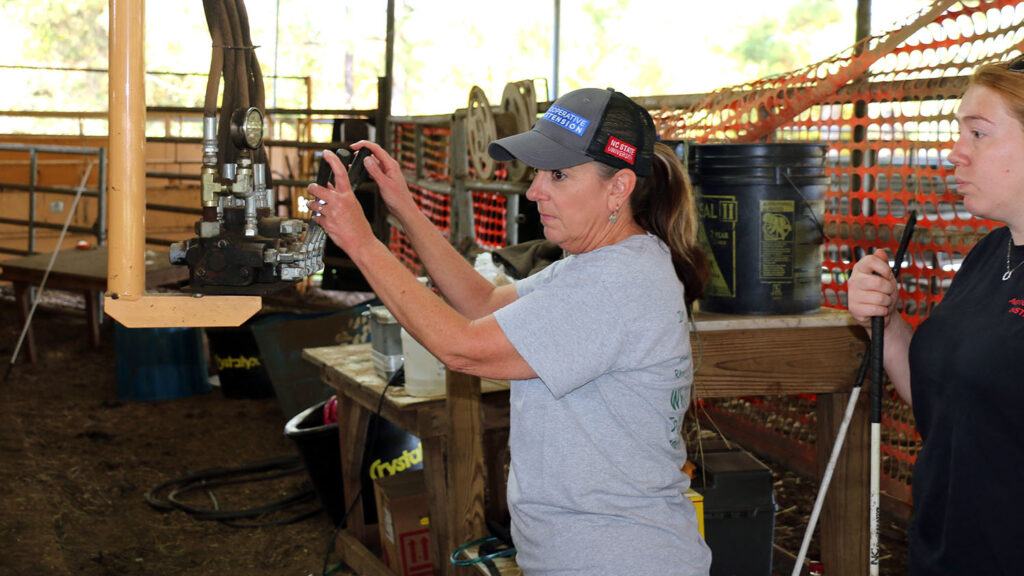
Kim Woods, NC State Extension agriculture/animal science agent for Granville and Person counties, works the chute at a bull breeding soundness exam clinic in Granville County.
Woods credits Granville County Farm Bureau for providing support money so producers can bring bulls at a reduced cost. There is a nominal charge of $20 per animal to help cover expenses. That’s much less than a visit to a veterinarian to perform the same test — and significantly less than the economic penalty of putting an infertile bull with the cows during breeding season.
“The research shows that probably 20% of bulls will fail this test,” Van Dyke said. “If you put a bull in who is not fertilizing your cows it can be a financial disaster when it comes time for the cows to calve. You end up with a lot of open cows.”
Cattlemen from Granville, Person, Franklin, Warren and other counties brought bulls to be tested. They included William Pyle, a beef producer who has a herd of about 50 cows in Franklin County. He brought 10 bulls to be tested.
“This has been something that we’ve done for about 10 years where we bring the bulls up here,” he said. “It absolutely helps to know our bulls are OK for breeding. And it provides an opportunity for the vet school, for their students to get hands-on experience.”
It also provides information about the soundness of a bull that is up for sale. Harris did not bring a bull to the clinic, but came to purchase a couple for his farm — provided they passed the test.
“This bull test here will not completely foolproof your breeding program, but it certainly helps eliminate some of the possibilities of things going wrong,” he said.
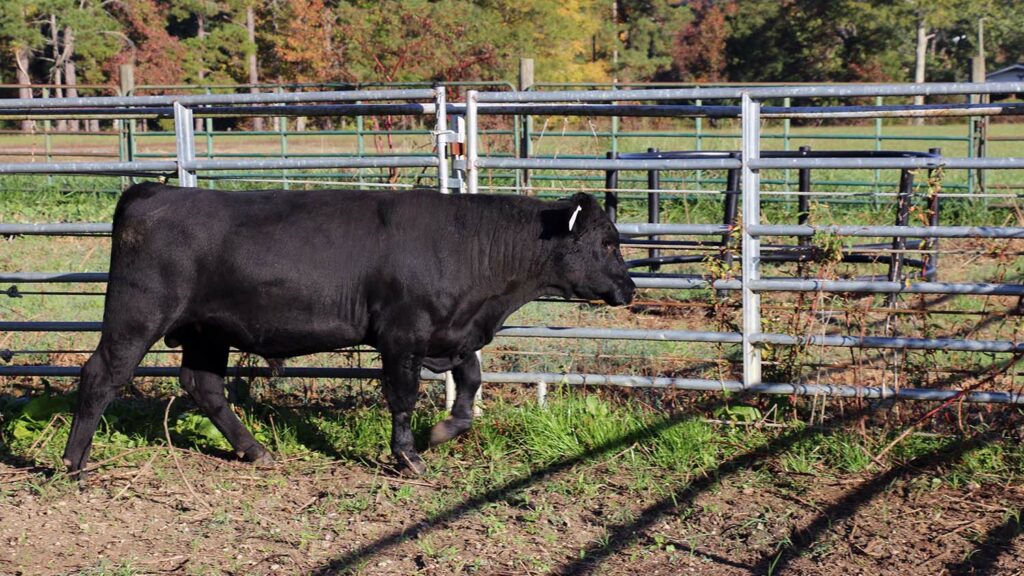
After being tested a bull is moved to a holding pen before being transported back to the farm.
That is important, because as with all types of farmers across the state, there can be a thin line between profit and loss for cattlemen. Beef prices might seem high for consumers, but producers aren’t necessarily seeing a spike in income.
“The cattle business as we know it today was built on cheap land, cheap fertilizer, cheap fuel, cheap equipment, in relative terms to what we see today,” Harris said. “What we have to buy has gone up about 10 times, and what we sell three times. When I was a boy, it cost $70 a ton to fertilize, a new pickup truck was $1,800, a tractor was $3,500. You could buy land for $100 an acre. In 1969, when I graduated from State College, you could buy gas for $0.29 a gallon.”
NC State Extension supports the beef industry across North Carolina. Agriculture agents, researchers and other experts provide information about breeding, nutrition and forage, herd health and management, and other important topics.
Related: Converting waste products to quality beef
“Across North Carolina, the average herd size is about 35 mama cows,” Woods said. “We’ve got some with 300-500 mama cows and some people have five or 10, but I think the average across the state is somewhere around 35. Most of our operations here are cow/calf operations. The producers have mama cows. Those cows have calves, and those calves are what are sold to generate income for the farmer.”
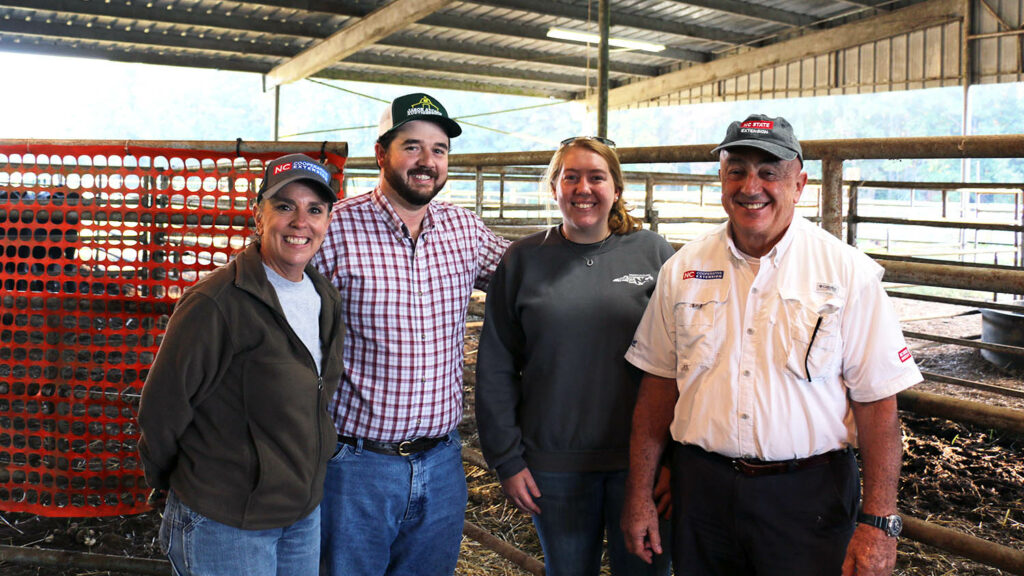
Helping at the bull breeding soundness exam clinic in Granville County were Kim Woods, NC State Extension agriculture/animal science agent for Granville and Person counties; Matthew Place, then the animal agriculture agent in Warren County and now the agriculture agent in Franklin County; Bailee Perkins, livestock agent in Caswell County; and NC State Extension Director Rich Bonanno.
Depending on breed and genetics, a bull can cost tens of thousands of dollars, but the average cost of an Angus bull is $3,000-$5,000.
“That’s just the purchase price,” Woods said. “Then they’ve got to care for it, feed it, any type of vet work that may need to be done for it. So it can be a very significant investment.”
A healthy bull should be able to sire calves for six seasons, but if producers keep females the best practices call for bulls to be moved before they begin to breed daughters.
“Sometimes people will buy a bull together and this person uses it for three years, and that person uses it for three years,” Woods said. “Or somebody will buy it, use it for three years and they’ll sell it to somebody else.”
The gestation period of a cow is about nine months. Weaned calves sell for about $800-$1,200. Cows are typically able to produce calves for 10-15 years.
“They’ve really not paid for their input costs until they’ve had about their sixth calf,” Woods said. “So that’s why we need to make sure that we do everything that we can so that they can have that many calves and hopefully more.”
While the test specifically tells whether a bull has the potential to breed, it can also give farmers information about their cows. If a fertile bull is in the field and a cow isn’t bred, it can provide a clue about where the problem might lie and inform decisions after the breeding season.
“Once that bull has been in there for 60, 90, 120 days, whatever the breeding season is that farmer has chosen to use, if that cow does not get bred, she will probably leave the farm in some way,” Woods said. “Most of them are probably going to end up in a stock market and then a lot of them are going to end up in some sort of food capacity if they have no other issues.”
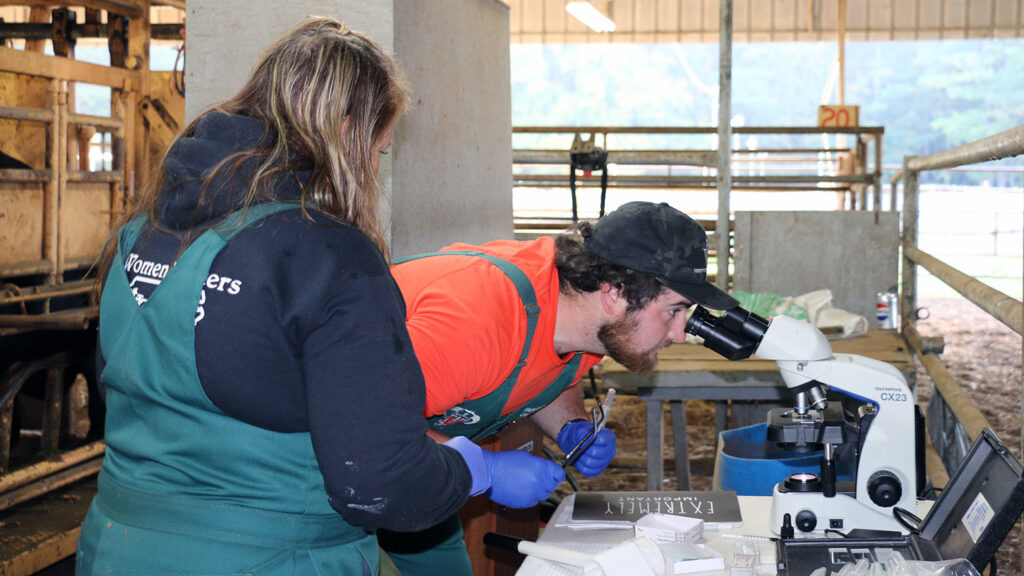
NC State veterinary student Nick Collier evaluates bull semen for motility and morphology as clinical technician Marissa Thompson looks on.
Another advantage of the bull breeding soundness exam clinic is the educational component. Van Dyke conducts a handful of such tests during the year, and always takes along students to give them hands-on experience. At the Granville County clinic it was Collier, who wants to be a large-animal vet.
“My family’s raised beef cattle in a commercial cow/calf operation since 2010 and enjoyed it,” he said. “Where we’re at in Randolph County there’s a big need for horse medicine, too. The small ruminant industry is growing around there as well. I’ll probably have to do a little bit of everything, but I’d definitely say large animal. There’s a big opportunity to really help producers in the preventative medicine side of things.”
The bull breeding tests might not technically count as medicine, but they prevent potential problems for farmers in the beef industry. Working with Van Dyke gave Collier skills he can use in a future practice.
“It’s definitely part of the learning experience,” he said. “I had never seen some of the morphologies on the sperm cells that I’ve seen today. If I don’t know, I can ask the person who knows.”
North Carolina Beef / Cattle Industry Value
- 100: N.C. counties with cattle
- 341K: *Number of beef cows on N.C. farms
- $260 million – economic impact of beef industry in N.C.
- 740K: Total cattle on N.C. farms
- $12.25B: ^Total economic impact of N.C. dairy industry
*Source: 2022 N.C. Agriculture Overview, USDA
^Source: USDA / International Dairy Foods Association

